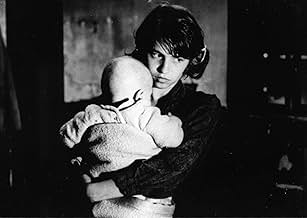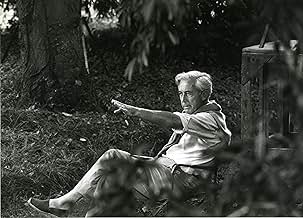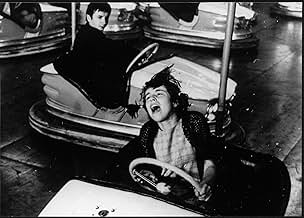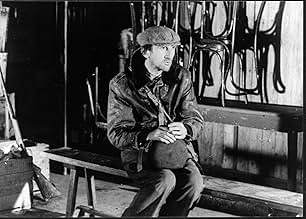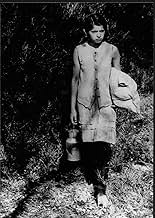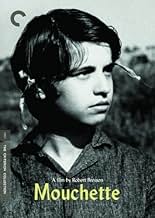IMDb-BEWERTUNG
7,7/10
13.746
IHRE BEWERTUNG
Füge eine Handlung in deiner Sprache hinzuA young girl living in the French countryside suffers constant indignities at the hand of alcoholism and her fellow man.A young girl living in the French countryside suffers constant indignities at the hand of alcoholism and her fellow man.A young girl living in the French countryside suffers constant indignities at the hand of alcoholism and her fellow man.
- Regie
- Drehbuch
- Hauptbesetzung
- Auszeichnungen
- 5 Gewinne & 1 Nominierung insgesamt
Empfohlene Bewertungen
After I watched Bresson's "Au Hasard Balthazar" a few years ago, I was advised by a friend to watch "Mouchette" next. I told him I wasn't particularly struck by the character development and the portrayal of humans and emotions in the former, and learned that I had the exact same problems with the latter.
The girl is amazing. Her justified rebellious behavior and her unique and authentic appearance really shine in this movie. Also, the photography in the film is very well done, as I would have dared to expect from Bresson. Technically, this movie certainly is very good.
However, the way people interact in this movie often doesn't make sense to me. And I know movies aren't obligated to be realistic, but this movie certainly has a lot of ingredients on board to make you believe it's trying to be realistic. It's not an absurd or surrealistic film where you won't have to expect to be able to completely understand emotions and social situations. The consequence is - to me at least - that my compassion doesn't know how to handle the situation. First something sad happens, and I get moved, but then there's weird silences or poetic expressions (not necessarily verbal) which don't fit the realistic context and interrupt the immersion if you ask me.
Another friend of mine with whom I discussed this topic mentioned a good point however: perhaps you should let go of the expectation to be moved emotionally. Doesn't the movie just try to display the story, possibly telling you to accept life for what it is without necessarily trying to move you? Well observed, it's possible. I still believe the movie could benefit strongly if it was more emotionally involving though.
I have had this discussion with a lot of people about several movies, and it seems nobody either understands or agrees with me on this subject. Therefore, I'm even more aware of how subjective this point of view is. Obviously, this movie isn't a classic for no reason and I'm sure it has plenty of qualities that let people appreciate it so much. Not entirely my cup of tea though.
The girl is amazing. Her justified rebellious behavior and her unique and authentic appearance really shine in this movie. Also, the photography in the film is very well done, as I would have dared to expect from Bresson. Technically, this movie certainly is very good.
However, the way people interact in this movie often doesn't make sense to me. And I know movies aren't obligated to be realistic, but this movie certainly has a lot of ingredients on board to make you believe it's trying to be realistic. It's not an absurd or surrealistic film where you won't have to expect to be able to completely understand emotions and social situations. The consequence is - to me at least - that my compassion doesn't know how to handle the situation. First something sad happens, and I get moved, but then there's weird silences or poetic expressions (not necessarily verbal) which don't fit the realistic context and interrupt the immersion if you ask me.
Another friend of mine with whom I discussed this topic mentioned a good point however: perhaps you should let go of the expectation to be moved emotionally. Doesn't the movie just try to display the story, possibly telling you to accept life for what it is without necessarily trying to move you? Well observed, it's possible. I still believe the movie could benefit strongly if it was more emotionally involving though.
I have had this discussion with a lot of people about several movies, and it seems nobody either understands or agrees with me on this subject. Therefore, I'm even more aware of how subjective this point of view is. Obviously, this movie isn't a classic for no reason and I'm sure it has plenty of qualities that let people appreciate it so much. Not entirely my cup of tea though.
Just like I remembered. The face of Nadine Nortier has not changed. The unbelievable "Mouchette" in this unforgettable Robert Bresson masterpiece. I hadn't seen the film since I was a teen ager. I saw it again last night and as if by magic it felt more contemporary today than it did then and then, let me tell you, it felt pretty real in its own rigorous lyrical style. What a shockingly wonderful effect a film like this could have on teen agers today. To stay with a character who takes us with nothing more than her naked truth through a landscape of absolute desolation. Her innocence intact, in spite of the outrage. Her ultimate act as breathtaking as anything we have ever seen on the screen, before or since. I tried to show the film to a group of twentysomethings, all of them walked away within the first fifteen minutes. All except one, a boy of 21, he had escaped Bosnia with his brother a few short years ago. As the film ended I looked at him. He was silent. He spoke without looking at me "can I see it again?" That's at the center of the experience that provides this film. "Mouchette" is meant for everyone, but it'll touch only some.
Mouchette is a young girl living in the country. Her mother is dying and her father does not take care of her. Mouchette remains silent in the face of the humiliations she undergoes. One night in a wood, she meets Arsene, the village poacher, who thinks he has just killed the local policeman. He tries to use Mouchette to build an alibi.
Robert Bresson knows how to make anything look beautiful. I always feel that black and white captures a scene better than color ever will, especially if the director (or cinematographer) knows how to really use the light and shadow Bresson gets it, and has always gotten it. He also seems to know ho to use children without exploiting them or making them overly sympathetic characters. The character of Mouchette is in many ways the queen of her own world... even if it may not be the best world.
Robert Bresson knows how to make anything look beautiful. I always feel that black and white captures a scene better than color ever will, especially if the director (or cinematographer) knows how to really use the light and shadow Bresson gets it, and has always gotten it. He also seems to know ho to use children without exploiting them or making them overly sympathetic characters. The character of Mouchette is in many ways the queen of her own world... even if it may not be the best world.
It seems entirely appropriate that the film opens with the metaphor of birds being snared as this seems to apply not only to Mouchette's life, but to Bresson's approach to the viewer as well.
For what, after all, is the director attempting to do here? Are we really to regard this as an unblinking gaze into the life of an abused, outcast girl? If so, why is Bresson so intent on excluding even the most fleeting moments of joy (or at least humor) that enter even the darkest of lives (I believe a philosopher once said "alas, joy too must have its day")? It is pretty telling that the one scene involving happiness for Mouchette is the most monotonous and lifeless in the picture (the bumper cars). Not only are we not allowed to experience her joy, but Bresson is careful to distance us from the real experience of her pain as well. This is done by the use of "gestures" (particularly prominent in Bresson's later films) that "signify" a character's experience rather than giving us the person's individualized emotional and visceral reactions to events. Thus the assault on Mouchette is shown in a distant, almost pantomimed manner, her relationship with her father is suggested by dropping coins in his hand, a disembodied hand slapping her face, etc. So, are we really to identify with Mouchette, to feel her pain, seeing how her experience of life intersects with our own in only the most symbolic, muted fashion? Is this really "compassion" and is this really Bresson's purpose?
Or is Mouchette a figure that Bresson uses (and dehumanizes), as literally every character in the movie uses her, to achieve other purposes? In this case the selling of a particular view of the world. One which sees the world as a snare, both in its joy and its pain, that is "saved" only by the (symbolic) suffering of the innocent, and transcended/transformed only by death. In other words a viewpoint that that advocates looking beyond (or turning away from)life to find "transcendent" truths. A view based on judgement rather than acceptance. And if this is "the truth" why must so much of what we experience as truth (such as joy, intimacy, occasional feelings of "oneness" with the world) be so forcibly excluded? Are these all really illusions, the world simply a snare? And without acceptance of ALL of Mouchette's reality can she,or any of us, really be redeemed?
Yes, Bresson is a meticulous, incisive, and occasionally powerful filmaker. But is he really honest? Are there some TRUTHS that he can't face (and so desperately restricts his view). In MOUCHETTE we are a little more aware of the puppeteer's strings than usual. 7 out of 10.
For what, after all, is the director attempting to do here? Are we really to regard this as an unblinking gaze into the life of an abused, outcast girl? If so, why is Bresson so intent on excluding even the most fleeting moments of joy (or at least humor) that enter even the darkest of lives (I believe a philosopher once said "alas, joy too must have its day")? It is pretty telling that the one scene involving happiness for Mouchette is the most monotonous and lifeless in the picture (the bumper cars). Not only are we not allowed to experience her joy, but Bresson is careful to distance us from the real experience of her pain as well. This is done by the use of "gestures" (particularly prominent in Bresson's later films) that "signify" a character's experience rather than giving us the person's individualized emotional and visceral reactions to events. Thus the assault on Mouchette is shown in a distant, almost pantomimed manner, her relationship with her father is suggested by dropping coins in his hand, a disembodied hand slapping her face, etc. So, are we really to identify with Mouchette, to feel her pain, seeing how her experience of life intersects with our own in only the most symbolic, muted fashion? Is this really "compassion" and is this really Bresson's purpose?
Or is Mouchette a figure that Bresson uses (and dehumanizes), as literally every character in the movie uses her, to achieve other purposes? In this case the selling of a particular view of the world. One which sees the world as a snare, both in its joy and its pain, that is "saved" only by the (symbolic) suffering of the innocent, and transcended/transformed only by death. In other words a viewpoint that that advocates looking beyond (or turning away from)life to find "transcendent" truths. A view based on judgement rather than acceptance. And if this is "the truth" why must so much of what we experience as truth (such as joy, intimacy, occasional feelings of "oneness" with the world) be so forcibly excluded? Are these all really illusions, the world simply a snare? And without acceptance of ALL of Mouchette's reality can she,or any of us, really be redeemed?
Yes, Bresson is a meticulous, incisive, and occasionally powerful filmaker. But is he really honest? Are there some TRUTHS that he can't face (and so desperately restricts his view). In MOUCHETTE we are a little more aware of the puppeteer's strings than usual. 7 out of 10.
... all suffered by a young girl and presented through the unique lens of Robert Bresson. A timeless story that could be replicated the world over today sadly, either we don't learn or we don't care and while that's the case, the Mouchettes of this world will be forever pulled under.
Wusstest du schon
- WissenswertesIt was rumored for years that the trailer for this film was by Jean-Luc Godard, and he has recently confirmed this by programming it in a self-curated retrospective of his work. The trailer is virtually a miniature essay on (or subversion of) the film, jarringly inter-cutting excerpts from it with a written commentary that calls it "Christian and sadistic."
- Patzer(at around 1 min) The canteen changes position after being dropped.
- VerbindungenEdited into Bande-annonce de 'Mouchette' (1967)
- SoundtracksMagnificat
Written by Claudio Monteverdi
Performed by Les Chanteurs de St. Eustache
Conducted by R.P. Émile Martin
Top-Auswahl
Melde dich zum Bewerten an und greife auf die Watchlist für personalisierte Empfehlungen zu.
- How long is Mouchette?Powered by Alexa
Details
- Laufzeit
- 1 Std. 21 Min.(81 min)
- Farbe
- Sound-Mix
- Seitenverhältnis
- 1.66 : 1
Zu dieser Seite beitragen
Bearbeitung vorschlagen oder fehlenden Inhalt hinzufügen

